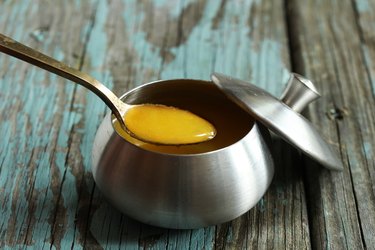
A clarified butter from Indian and Pakistan, ghee has been making its way into kitchens as an alternative to butter or dairy free butter. While it's high in fat content, it boasts a low amount of lactose along with a rich, nutty flavor.
What is Ghee?
Video of the Day
Ghee is a clarified butter that originated from India and Pakistan, says an October 2015 article from Molecular Genetics and Metabolism Reports. It's commonly used in Afghani, Bangladeshi, Kurdish, Pakistani and Sri Lankan cooking, and is often served with roti or rice, incorporated into curries and used for deep frying, as it has a high smoke point.
Video of the Day
It's made by heating butter, then extracting nonfat milk solids and dairy proteins: casein and whey, from the oil. Though ghee contains very low amounts of lactose and can often be tolerated by those with lactose intolerance as well as galactosaemia, it does contain high milk fat content, with quantity of 99.3 percent fat.
If you're wondering why use ghee over butter or a dairy free ghee substitute, East Coast Polytechnic Institute (ECPI) lays out some important health benefits, such as its anti-inflammatory properties, heart-healthy fats, source of antioxidants and moisturizing effects.
Read more: 3 Healthy Margarine Brands for Cholesterol
Ghee Dairy Intolerance
As ghee is low in lactose content, it's recommended for those who have lactose intolerance, dairy intolerance or those with galactosaemia. According to Women's and Children's Hospital in South Australia galactosaemia is a condition in which the body is not able to use a sugar called galactose, a component of lactose, the main sugar found in milk.
Lactose intolerance, on the other hand, is when your body doesn't produce enough lactase to break down lactose into smaller parts for absorption. That's when gastrointestinal symptoms can kick in: bloating and gas, stomach cramps, says Australia's Queensland Government website.
This is different from a milk allergy in that an allergy occurs when the immune system reacts to a specific protein, and causes an allergic reaction that can, in severe cases, be life-threatening, explains FARE. If you have a milk allergy, you should not have ghee as it does contain milk, says the Asthma and Allergy Foundation of America. Instead, you can try a dairy-free butter or dairy free ghee substitute.
Read more: How is Lactose-Free Milk Made?
Benefits and Nutritional Facts
If you're wondering: why use ghee over butter or other butter substitutes? then take note of its benefits. Besides for its tasty nutty, rich flavor, it contains very little lactose, so those with lactose intolerance can breathe a sigh of relief. What's more, it contains high levels of vitamin E, which according to NIH, acts as an antioxidant, protecting cells from damage triggered by free radicals.
Yes, ghee also contains a high amount of saturated fat — 71.43 grams per 100 grams — to be exact, and we know that too much saturated fat can increase the risk of stroke and heart disease. But, according to the NHS, fats are not entirely harmful when consumed in proper amounts.
They contain HDL cholesterol, which takes cholesterol (where it's too abundant) from areas of the body to the liver, where it's then discarded. Fats can also help you absorb fat soluble vitamins, such as vitamin E and vitamin A.
Making it to the list of benefits: anti-inflammatory properties. According to ECPI, ghee contains butyrate, a fatty acid that purportedly soothes inflammation. Alas, the benefits of ghee go beyond the plate, as a moisturizer for dry skin and hair. Application to the scalp or skin can help alleviate dryness. Despite its impressive list of benefits, there's little evidence that ghee is much healthier than butter or butter substitutes.
- Asthma and Allergy Foundation of America: "Milk Allergy"
- Molecular Genetics and Metabolism Reports: "The Lactose and Galactose Content of Milk Fats and Suitaility for Galactosaemia"
- Queensland Government: "Diet and Lactose Intolerance"
- ECPI University: "9 Health Benefits of Ghee"
- USDA: "Ghee Clarified Butter"
- FARE: "Milk Allergy Vs. Lactose Intolerance"
- NHS: "Fat: The Facts"
- NIH: "Vitamin E"
- Women's and Children's Hospital: "Galactosaemia Fact Sheet"